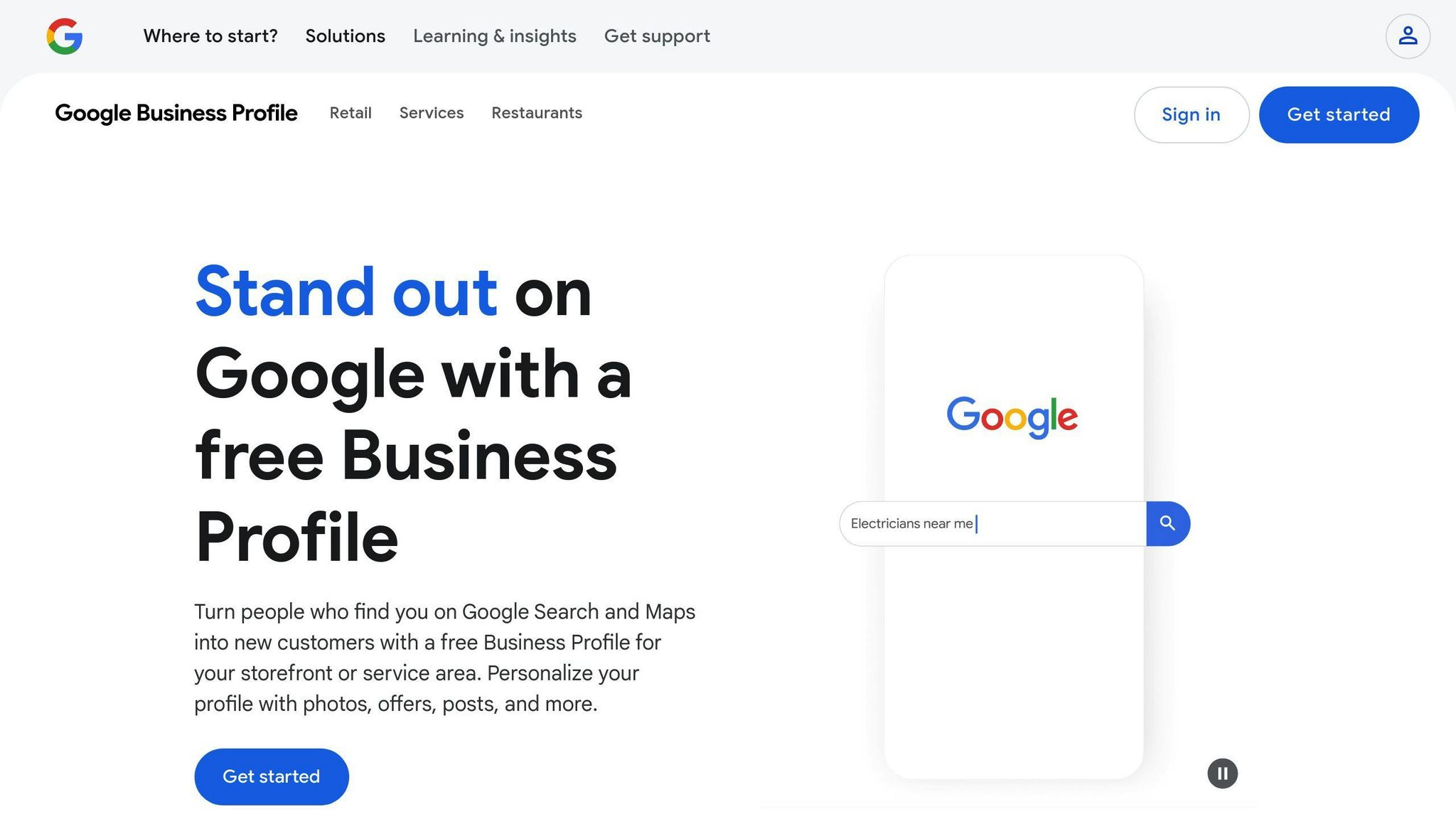Voice search is reshaping real estate. With over 1 billion voice queries monthly and 58% of users relying on it for local business info, optimizing for voice search is critical. Here’s how real estate professionals can adapt:
- Focus on Conversational Keywords: Align content with natural, question-based queries like “What homes in Miami have pools?”
- Optimize Local SEO: Update Google My Business with accurate details, photos, and reviews.
- Leverage Schema Markup: Use structured data to ensure voice assistants deliver precise property and business info.
- Create Mobile-Friendly Content: Most voice searches happen on mobile - ensure your site is fast and responsive.
- Use AI Tools: Tools like SEObot and Epique help analyze voice trends and craft voice-optimized property descriptions.
Voice search is growing fast. By adapting now, you can connect with voice-first homebuyers and stay ahead in the evolving real estate market.
Voice Search SEO For Real Estate Agents
How to Optimize for Voice Search in Real Estate
Voice search optimization means adjusting your content, business profiles, and local strategies to match how people interact with voice assistants.
Use Conversational and Long-Tail Keywords
Voice searches often mimic natural speech, so your content should reflect this. Here's how voice queries differ from traditional searches in real estate:
| Traditional Keyword | Voice Search Query | Content Optimization Example |
|---|---|---|
| "luxury homes Miami" | "What luxury homes are available in Miami under $2 million?" | Include detailed price ranges and amenities in property listings |
| "best school district" | "Which neighborhoods in Boston have the highest-rated elementary schools?" | Provide neighborhood guides with school ratings and stats |
| "apartment amenities" | "What apartments in LA have pools and gyms?" | Highlight specific property features in listings and descriptions |
By aligning your content with conversational queries, you're making it easier for voice assistants to find and share your information. But that's just one part of the equation - your business also needs to be visible on local search tools like Google My Business.
Optimize Your Google My Business Profile

To improve your local visibility, make sure your Google My Business (GMB) profile is in top shape. Here's what to focus on:
- Verify your business location on GMB.
- Keep your business hours updated.
- Add photos of properties and team members regularly.
- Respond quickly to client reviews.
- Highlight the neighborhoods and areas you specialize in.
A well-maintained GMB profile increases your chances of being featured in voice search results, especially for local queries.
Create Content for Local Audiences
Develop hyper-local content that directly answers voice search questions. Examples include neighborhood guides, FAQs, and market reports.
1. Market Reports
Publish short, clear updates on pricing trends, inventory, and local developments. Structure this content to address specific voice queries about the market.
Did you know that 40.7% of voice search answers come from featured snippets? Use clear headings and concise answers to common questions to increase the chances of your content being selected by voice assistants. This approach ensures your site is ready to meet the needs of voice search users.
Advanced Techniques for Voice Search Optimization
Schema markup and mobile optimization are two key strategies to improve your real estate website's performance in voice search. Here's how they work and why they matter.
Use Schema Markup
Schema markup provides structured data that helps search engines and voice assistants better understand your content. For real estate professionals, this means voice assistants can deliver accurate details about properties, business hours, and contact information directly to users.
| Schema Type | Purpose |
|---|---|
| RealEstateAgent | Business Information |
| RealEstateListing | Property Details |
| Business | Local Presence |
By integrating schema markup, you ensure voice assistants can respond precisely to user queries. For example, if someone asks about your office hours or specific property features, structured data ensures they get the right information.
Make Your Website Mobile-Friendly
Since most voice searches happen on mobile devices, a mobile-friendly website is essential for success in voice search results.
Here are some mobile optimization tips:
- Speed Optimization: Use tools like Google's PageSpeed Insights to analyze your site's performance and make it load faster on mobile devices.
- Responsive Design: Ensure your site adapts to all screen sizes with readable text, clickable buttons, scalable images, and smooth navigation.
sbb-itb-db182b0
Using AI Tools to Improve Voice Search and Marketing
AI tools can supercharge your voice search strategy by automating key tasks and streamlining optimization efforts. This builds on techniques like schema markup and mobile optimization, helping you stay ahead in an increasingly voice-driven world.
Discover AI Tools for Real Estate Agents

AI-powered tools are now tailored specifically for real estate professionals, making voice search optimization easier than ever. Here are some standout options:
| Tool | How It Helps with Voice Search |
|---|---|
| Dialzara | Tracks patterns in voice searches and conversions |
| SEObot | Recommends voice-friendly keywords for local markets |
| Epique | Generates conversational property descriptions |
These tools integrate seamlessly with your existing strategies. For example, SEObot can pinpoint trending voice queries in your area, while Epique crafts descriptions that align with how people naturally speak when searching.
Build Voice-Optimized Listings and Ads
Turn your property listings into content that works perfectly for voice search by leveraging AI insights. Here's how:
-
Analyze Local Voice Patterns
Use AI to uncover common voice queries in your area, track which property features users mention most, and see which voice searches lead to real inquiries. -
Optimize Your Content
Include references to well-known local landmarks, adopt conversational language that matches voice search habits, and structure descriptions to directly answer common questions.
These steps ensure your listings and ads are easy to find and resonate with voice search users.
Conclusion and What's Next for Voice Search
Key Takeaways
Voice search is transforming how consumers find information, and for real estate professionals, staying ahead of this shift is crucial. With over 1 billion voice queries processed monthly and 58% of users relying on it for local business searches, optimizing for voice search is no longer optional. Success hinges on combining local SEO, conversational keywords, technical tools like schema markup, and AI-driven strategies to make the process smoother.
Getting Ready for Voice Search Innovations
The future of voice search is tied to smart home systems and augmented reality, opening up fresh ways to market properties. These advancements are changing how buyers explore listings and connect with real estate agents.
Emerging trends include:
- Smart Home Integration: Imagine virtual property tours triggered by voice, smart devices providing neighborhood details, or home assistants conducting property searches with just a command.
- Augmented Reality (AR): Think voice-controlled AR tools for property visualizations, interactive neighborhood tours, or virtual staging demos - all controlled by simple voice commands.
- Enhanced Voice Assistants: Expect smarter search options, better natural language understanding for real estate questions, and personalized property suggestions based on voice input.
To keep pace, agents should focus on:
- Building mobile-friendly websites
- Using detailed structured data
- Creating hyper-local content
- Leveraging AI tools to analyze and optimize for voice search
As voice technology blends with smart home features and AR, it’s shifting the landscape of real estate marketing. Those who adapt now will be ready to meet the needs of tomorrow’s voice-first homebuyers.
FAQs
How many people use voice search in 2024?
In 2024, 20.5% of global users rely on voice search. Worldwide, there are expected to be 8.4 billion voice assistants, with 149.8 million users in the U.S. alone. These numbers highlight how voice search is influencing real estate searches and interactions with clients.
Why is voice search important for real estate professionals?
With 58% of consumers using voice search to find local business information, real estate professionals need to adjust their digital strategies to reach this audience. Creating voice-optimized content that aligns with how people search for properties and services is key to staying relevant.
How can I track the success of voice search?
You can evaluate your voice search performance by monitoring organic traffic, checking how often your business appears in local searches, and analyzing the leads generated from voice-optimized content.
What are typical real estate-related voice searches?
Common voice queries include property searches, home valuations, and finding local realtors. Recognizing these trends can help you craft content that works well with voice search.
How does Google My Business affect voice search?
Having a fully updated Google My Business profile increases your visibility in local voice searches, making it easier for potential clients to find your services through voice assistants.
AI tools, like those listed on AI Tools for Real Estate Agents, can help you analyze and improve your content for voice search. As this technology evolves, staying ahead will help your real estate business remain competitive in this expanding market.


